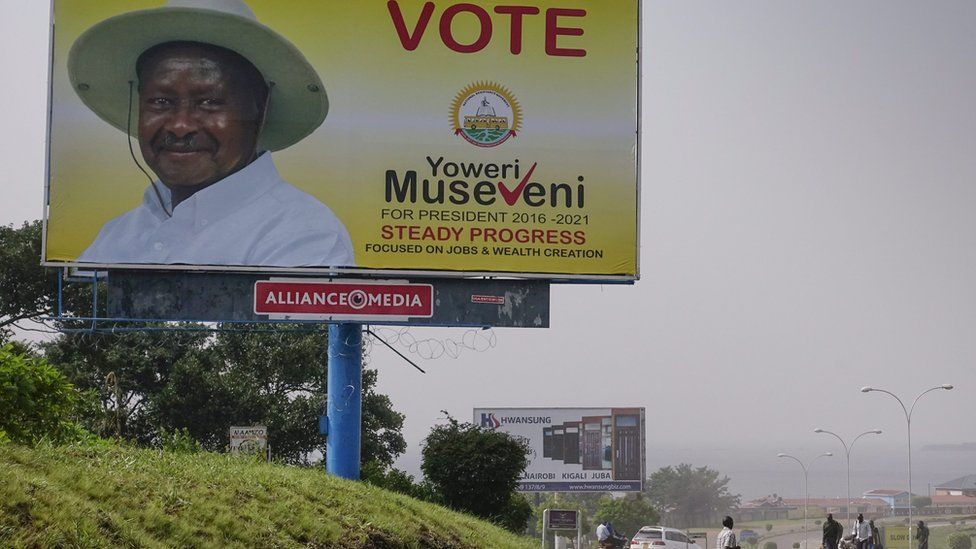Uganda election: Issues, candidates and the poll
- Published

Ugandans vote in presidential, parliamentary and local elections on 18 February, in the third polls since the restoration of multiparty politics in 2005.
President Yoweri Museveni is seeking to extend his 30-year rule and, in vying against seven opposition candidates for a fifth term, he faces his toughest challenge yet.
There are just over 15 million registered electors, out of an estimated population of 37 million.
Who are the main presidential candidates?
President Museveni has been in office since winning a five-year guerrilla war in 1986. At the age of 71, he is one of Africa's longest-serving leaders, and has brooked little opposition to his rule.
His final term was meant to end in May 2006, but in 2005 he won a campaign to lift the constitutional term limits.
Mr Museveni faces criticism from the West over the country's worsening human rights record, and has responded by accusing Western donors of interfering in Uganda's internal affairs.
Kizza Besigye has stood against his former comrade-in-arms President Museveni in the last three presidential elections on behalf of the main opposition Forum for Democratic Change (FDC).
Amama Mbabazi is another veteran of the governing National Resistance Movement (NRM) to fall out with President Museveni.
He served as prime minister in 2011-2014, when he was dismissed after announcing he would launch a rival presidential bid. He is standing as an independent for the GoForward pressure group.
Major presidential contenders:
- Kizza Besigye, 59, veteran opposition leader and once personal doctor to incumbent President Museveni
- Amama Mbabazi, 67, former ally of President Museveni and once prime minister and also served as defence, security and justice ministers
- Yoweri Museveni, 71, in power since 1986 - says Uganda is like a banana farm he planted that is now bearing fruit
Ugandan media reports say the government is concerned at Mr Mbabazi's challenge, as he is an insider with extensive connections who could possibly siphon off votes from NRM supporters looking for fresh faces at the top.
The other candidates are unlikely to have any meaningful impact on the outcome of the elections.
How does the voting system work?
The president has executive power as head of state, and is elected for a five-year term.
A candidate is required to win 50% plus one vote in order to win, or else face a run-off with the second-ranked candidate within 30 days.
Parliament has 418 seats, following the creation of 43 new constituencies in 2015.
Members are elected by the first-past-the-post system, with some seats reserved for women, the disabled, and other groups.
Opposition parties allege that the electoral commission has failed to update the voters roll since 2011, which could have an impact on the result if true.
What are the main election issues?
The persistently high unemployment rate, corruption, and the quality of public services are major issues for voters.
Not surprisingly, the top three candidates have highlighted infrastructure development, fighting corruption, job creation, better and affordable health care as their priorities.
How best to exploit the country's oil reserves, discovered in 2006, has also been a subject of debate.
Has the election campaign been free and fair?
The Human Rights Network-Uganda and the international group Human Rights Watch have reported an intensifying government crackdown on opposition leaders, their supporters and the media.
Both Mr Mbabazi and Mr Besigye have had their rallies broken up over allegations that they were unsanctioned.
The state has also restricted opposition access to the media.
In January police raided a printing press in Kampala where the FDC manifesto was being printed, and the government barred the independent NTV Uganda channel from NRM rallies over what it deemed to be poor coverage of President Museveni's campaign.
African Centre for Media Excellence analysis of December coverage says the state-owned Uganda Broadcasting Corporation gave President Museveni 44% of its airtime, Mr Mbabazi 24%, and Mr Besigye just 4%.
Who is likely to win the presidential race?
Despite discontent over public services and transparency, and a stronger-than-usual opposition challenge, President Museveni is widely expected to win re-election.
The failure of the opposition to field a joint candidate after talks in October 2015 is one factor, and the desire to maintain stability another.
BBC Monitoring reports and analyses news from TV, radio, web and print media around the world. You can follow BBC Monitoring on Twitter and Facebook.
- Published16 February 2016
- Published17 February 2016
- Published17 February 2016
- Published17 February 2016
- Published26 April 2023